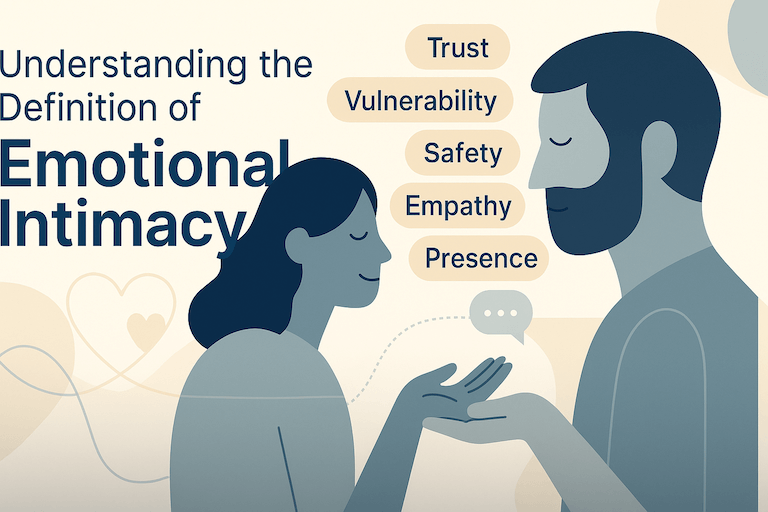Understanding the Definition of Emotional Intimacy
Emotional intimacy sounds like something reserved for only the deepest relationships but it plays a central role in just about every meaningful connection you have. Surprisingly, research even shows that emotional intimacy has a direct effect on relationship satisfaction for 60 out of 60 couples studied. Most people think it takes years to build but the real secret is that emotional intimacy can start growing from the very first honest conversation.
Quick Summary
| Takeaway | Explanation |
|---|---|
| Emotional intimacy is essential for healthy relationships. | It provides a psychological foundation that enhances connection and satisfaction between partners. |
| Vulnerability fosters deeper emotional bonds. | Sharing fears and insecurities builds trust and allows for genuine understanding in relationships. |
| Active listening is key to emotional safety. | Empathetic listening creates an environment where individuals feel accepted and understood. |
| Emotional intimacy develops over time. | It requires consistent engagement, mutual understanding, and patience as relationships evolve. |
| Building emotional intimacy enhances mental resilience. | Strong emotional connections improve stress management and overall well-being for individuals and their relationships. |
What is Emotional Intimacy? Defining the Concept
Emotional intimacy represents a profound psychological connection between individuals that transcends physical proximity or superficial interactions. At its core, it involves creating a safe emotional landscape where vulnerability, trust, and genuine understanding can flourish. According to research from the National Institutes of Health, emotional intimacy is characterized by deep interpersonal bonding that allows individuals to share their innermost thoughts, feelings, and experiences without fear of judgment.
The Essential Components of Emotional Intimacy
Emotional intimacy is not a singular experience but a complex interplay of psychological and relational dynamics. The fundamental components include:
Vulnerability: Willingness to share personal fears, dreams, and insecurities
Active Listening: Genuine engagement and empathetic understanding
Mutual Trust: Creating a consistent environment of emotional safety
Authentic Communication: Expressing genuine feelings without manipulation
These elements work synergistically to create a profound sense of connection that goes beyond mere conversation. When partners or close friends achieve true emotional intimacy, they develop a unique form of communication that often transcends verbal language.
Understanding the Psychological Significance
Emotional intimacy serves critical psychological functions in human relationships. It provides a foundational framework for emotional regulation, personal growth, and interpersonal healing. By creating spaces of unconditional acceptance, individuals can explore their inner emotional landscapes without reservation. Learn more about building secure emotional connections through our comprehensive guide on attachment styles.
Ultimately, emotional intimacy is not about perfection but about creating genuine human connections that honor each person's unique emotional experience.
Below is a table summarizing the main components of emotional intimacy and their roles in building meaningful connections.
| Component | Description | Role in Emotional Intimacy |
|---|---|---|
| Vulnerability | Sharing fears, dreams, and insecurities | Builds trust and allows for deep connection |
| Active Listening | Genuine engagement and empathetic understanding | Creates emotional safety and mutual respect |
| Mutual Trust | Consistent emotional reliability | Encourages openness and honesty |
| Authentic Communication | Expressing genuine feelings without manipulation | Fosters transparency and authentic interaction |
| Empathetic Listening | Understanding without judgment | Enriches mutual understanding and acceptance |
| Emotional Safety | Secure psychological environment | Reduces fear of judgment and enhances closeness |
| Authentic Self-Expression | Sharing true internal experiences | Promotes acceptance of one another |
Why Emotional Intimacy Matters in Relationships
Emotional intimacy represents more than a mere relationship enhancement. It is a fundamental psychological mechanism that determines the depth, resilience, and overall quality of human connections. Research from PubMed reveals that emotional intimacy plays a critical role in relationship satisfaction, influencing how partners perceive and experience their interpersonal bonds.
The Psychological Impact of Emotional Connection
Emotional intimacy serves several profound psychological functions that are essential for individual and relational well-being:
Psychological Safety: Creates an environment where individuals feel accepted and understood
Emotional Regulation: Helps partners manage stress and navigate complex emotional landscapes
Personal Growth: Provides a supportive framework for individual development and self-exploration
Conflict Resolution: Enables more empathetic and constructive approaches to relationship challenges
These functions transform emotional intimacy from a desirable relationship trait into a critical psychological resource that supports mental health and interpersonal resilience.
Building Relationship Resilience
When couples develop deep emotional intimacy, they create a powerful buffer against external stressors and relationship challenges. This intimate connection allows partners to communicate more effectively, understand each other's underlying emotional needs, and provide genuine support during difficult times. Learn more about healing relationship dynamics through our comprehensive relationship guidance.
Ultimately, emotional intimacy is not a luxury but a necessary component of healthy, thriving relationships. It requires continuous investment, vulnerability, and a genuine commitment to understanding and supporting one another's emotional experiences.
How Emotional Intimacy Develops Over Time
Emotional intimacy is not a static experience but a dynamic process that evolves through consistent interaction, vulnerability, and mutual understanding. Research exploring developmental patterns demonstrates that the capacity for emotional intimacy is deeply influenced by personal history, early relationship experiences, and individual psychological development.
The Progressive Stages of Emotional Connection
Emotional intimacy typically unfolds through several interconnected stages, each characterized by increasing depth and complexity:
Initial Exploration: Tentative sharing of surface-level thoughts and experiences
Gradual Vulnerability: Incremental disclosure of more personal emotions and experiences
Deep Mutual Understanding: Developing profound empathy and intuitive emotional communication
Sustained Intimacy: Maintaining emotional connection through consistent engagement and support
These stages are not linear but represent a fluid, ongoing process of relationship development that requires active participation from both individuals.
This table outlines the typical stages of emotional intimacy development, highlighting what each stage involves and its significance to growing relational closeness.
| Stage | What It Involves | Significance |
|---|---|---|
| Initial Exploration | Tentative sharing of surface-level thoughts and experiences | Establishes basic trust and rapport |
| Gradual Vulnerability | Incremental disclosure of personal emotions and experiences | Deepens mutual empathy and comfort |
| Deep Mutual Understanding | Development of profound empathy and intuitive communication | Builds strong, intuitive emotional connection |
| Sustained Intimacy | Consistent engagement and ongoing support | Maintains and strengthens relational bonds |
Factors Influencing Emotional Intimacy Development
Multiple psychological and relational factors contribute to the growth of emotional intimacy. Trust, consistent communication, shared experiences, and emotional safety create a fertile ground for deeper connection. Critically, individuals must be willing to be vulnerable, practice active listening, and demonstrate genuine empathy. Learn about potential relationship challenges to better understand potential barriers to emotional intimacy.
Ultimately, emotional intimacy is a lifelong journey of mutual understanding, requiring continuous investment, patience, and a genuine commitment to emotional authenticity. It represents not just a relationship goal but a profound pathway to human connection and personal growth.
Key Elements of Emotional Intimacy
Emotional intimacy is a multifaceted psychological experience that emerges through complex interpersonal interactions. According to research using the Emotional Intimacy Scale, several core elements define and characterize genuine emotional connection between individuals.
Core Psychological Components
Emotional intimacy is constructed through intricate psychological mechanisms that require deliberate engagement and mutual commitment:
Vulnerability: The willingness to expose authentic emotional experiences
Empathetic Listening: Creating space for understanding without judgment
Emotional Safety: Establishing a secure psychological environment
Authentic Self-Expression: Communicating genuine internal experiences
These components work synergistically to create a profound sense of interpersonal understanding that transcends surface-level interactions.
Constructing Emotional Connection
Building emotional intimacy requires intentional practices that cultivate deeper psychological connections. Trust, consistent communication, and mutual respect form the foundational framework for developing meaningful emotional bonds. Partners must demonstrate a genuine commitment to understanding each other's inner emotional landscapes, which involves actively listening, validating experiences, and responding with compassion. Learn more about building healthy relationship dynamics through our comprehensive relationship guidance.
Ultimately, emotional intimacy is not a destination but a continuous journey of mutual exploration, requiring ongoing emotional investment, patience, and a profound commitment to understanding one another's unique emotional experiences.
Real-World Implications of Emotional Intimacy
Emotional intimacy extends far beyond theoretical concepts, profoundly impacting various dimensions of human experience and relationship dynamics. Research involving 60 couples demonstrates that emotional intimacy has tangible, measurable effects on relationship satisfaction and individual well-being.
Psychological and Relational Outcomes
The real-world manifestations of emotional intimacy are both complex and transformative, influencing multiple aspects of personal and interpersonal functioning:
Mental Health Resilience: Enhanced ability to navigate psychological challenges
Relationship Satisfaction: Deeper connection and mutual understanding
Stress Management: Improved emotional regulation and support mechanisms
Communication Quality: More authentic and meaningful interpersonal exchanges
These outcomes illustrate how emotional intimacy serves as a critical psychological resource that supports individual and collective emotional health.
Practical Implications Across Life Domains
Emotional intimacy significantly impacts various life spheres, from personal relationships to professional interactions. By fostering genuine understanding and empathetic communication, individuals can create more meaningful connections that transcend traditional relationship boundaries. Partners who cultivate emotional intimacy demonstrate greater capacity for conflict resolution, mutual support, and shared personal growth. Explore the intricate connections between intimacy and relationship dynamics to gain deeper insights into these complex interpersonal experiences.
Ultimately, emotional intimacy represents a powerful mechanism for human connection, offering a pathway to more profound, authentic, and resilient relationships across all areas of life.
Ready to Turn Emotional Intimacy Into Lasting Relationship Strength?
If you are searching for deeper connection, safety, and trust in your relationship but struggle to achieve true emotional intimacy, you are not alone. The article on emotional intimacy highlights how vital vulnerability, communication, and mutual understanding are for building meaningful bonds. Many couples find themselves stuck at surface-level interactions, feeling isolated or misunderstood even while longing for more closeness. Imagine what your relationship could look like with the support of an experienced therapist who understands the journey toward authentic connection.
Our team at South Denver Therapy in Castle Rock is ready to help. Whether you want to build emotional intimacy, recover from past challenges, or simply reconnect, our specialized Couples Counseling and individual support are designed for lasting change. We welcome new patients for both in person sessions and secure virtual appointments across Colorado. Take your next step toward the deep and rewarding intimacy you deserve—book your first session today.
Frequently Asked Questions
What is emotional intimacy?
Emotional intimacy is a profound psychological connection between individuals that involves vulnerability, trust, and genuine understanding, allowing them to share their innermost thoughts and feelings without fear of judgment.
Why does emotional intimacy matter in relationships?
Emotional intimacy is crucial for relationship satisfaction as it fosters psychological safety, emotional regulation, personal growth, and effective conflict resolution, ultimately improving the quality of interpersonal bonds.
How does emotional intimacy develop over time?
Emotional intimacy develops through a dynamic process that includes stages such as initial exploration, gradual vulnerability, deep mutual understanding, and sustained intimacy, requiring active participation and commitment from both individuals.
What are the key components of emotional intimacy?
The key components of emotional intimacy include vulnerability, empathetic listening, emotional safety, and authentic self-expression, which collectively create a deeper psychological connection between individuals.



